#SPECIFICALLY people trying to apply the term to individuals
Explore tagged Tumblr posts
Text
what if we held on to whatever we get the idea of as Normal as unquestionable & think all you can do to this normal is apply some veneers overtop it to be more polite & also resent that. maybe we could project that everyone who seems to be Annoyingly Disruptively doing more than this must be putting on a performance to look good &/or humor others b/c that's all we ever believe we're doing, & again, we resent even that much....maybe we could use our show of More Polite language to make the same points blaming everyone who our Normal mistreats for their own mistreatment
#perhaps we could lecture autistic people on their; ah; Lacking Social Skills or Intelligence. it's just matter of fact#completely neutral what Annoys those who do well enough when thrown into any group settings; completely neutral how they React#like yeah can't possibly take issue w/anything Acceptable to Encouraged in the realm of even ''successful'' ''normal'' social interactions#infinite ''smh this is why nobody takes ableism seriously'' like oh you mean b/c of the ableism? is why you don't take it seriously?#infinite ways of phrasing that everyone alleged so Annoying With It is just like you but someone actively Putting On An Act too much#all it can possibly be. just as someone's Anti Ableism would be knowingly ''humoring'' / ''tolerating'' an autistic person e.g.#ah you see to this Person Who Identifies As Nonbinary's face i will try to mostly use Their Preferred Pronouns. that's that done#but it's sooo annoying. what's next; multiple &/or changing pronouns? god even worse. so Inflicted Upon my correct norm#if i'm not feeling actively malicious & devious in how i treat someone i am surely as righteous as it gets#having to improve on perfection by occasionally feeling Put Upon to perform politeness around some individuals? ughhh#that's why it's actually illegitimate. shouldn't have to be Put Upon like that. (finding the norm Questionable? out of the question Lol)#shocked ppl report that casual usage of the r word is having a revival. by shocked i mean [already clear ppl didn't care abt that]#& again just the current ''polite'' rephrasing of ableism like oh um :) disabled ppl are just a Specific kind of unintelligent & unskilled#& unprofessional & incompetent & a harmful scourge :) & maybe if they learned to be otherwise they wouldn't be punished :)#just formalized ABA vs the less formalized ABA huh. & the [the Real ableism] it ostensibly is to be saying all this i'm sure#something something not a real ally if they encourage behavior that will Make other ppl treat you badly. helpless neurotypicality :(#just as the ppl saying ableism is baked into terms & phrases used casually well beyond the [bad but lol guess not That Bad r word]#were definitely the ones Advancing Ableism by annoyingly overdoing the Polite Veneer you imagine they were Demanding#(rather than a more thorough questioning of language & accepted ''norms'' in pointing out the logics in their usage / basis)#simultaneously as being too much to ask it was also always so Frivolous as to not be worth the apparently infinitesimal effort#hmm guess we'll never solve the contradictions there....#not even with the ''openly saying 'see? i don't take ableism seriously & now it's Your Fault b/c i saw this & scoffed at it''' clues#& a final shoutout to the classic ''it's called being Realistic'' language in this & wherever else relevantly applied lol. we could go on
3 notes
·
View notes
Text
Plotting a story -- inductive and deductive plotting
When it comes to plotting habits in writing fiction, there’s a scale. Most people label the ends of this scale ‘gardener’ and ‘architect’, although the terms ‘plotter’ and ‘pantser’ are also in use. If you’re a writer, you probably know this scale, but I’ll briefly explain for those who haven’t and then get into my model.
An architect, or plotter, is a writer who thrives with a lot of planning. Like an architect planning a house, they assess what story they’re telling in advance and what needs to happen to tell it. They assess the materials, plan and measure the acts (if they’re using an act structure), decide on the climax and how the characters will develop and map those onto the plan. Then, with a plan, they write.
A gardener, or pantser, by contrast, writes ‘by the seat of their pants’. Pantsers may or may not know where their story is going in broad terms, but they certainly don’t know in any detail beyond ‘this’ll be a cool scene if I can get it there’. To these people, writing is less like architecture and more like gardening – you can build your beds and plant your seeds, but a whole lot of what’s going to happen next depends on how the plants grow, and all you can do is keep an eye on them and prune or train them as necessary. You can dream about what your garden will look like in the spring, but you won’t know until you get there.
Plotters and pantsers are not two distinct categories of writers, but ends on a scale. The writer who ad libs sentence by sentence with no goal at all is extremely rare, as is the writer who starts from an overall view of the plot and cuts it down and down until they’re planning on the sentence level. Most writers tend towards one end of the scale to a greater or lesser degree, but very few write completely using one method and none of the other.
The plotter/pantser scale is one that many writers find incredibly useful to help them understand their own process. By knowing where you are on this scale, you can better understand how you write and better understand how the habits and advice of other writers may or may not be useful to you. (A pantser trying to meticulously plot their story in advance following some formula they found in a writing advice book is wasting their time.) However, this model has little utility beyond that, which is why I find it more useful to address the phenomenon not as a scale, but as the manifestation of two separate skills, that I like to call deductive and inductive plotting.
In logic, deductive reasoning is when you take broad rules or generalities and apply them to specific circumstances to predict things – you start big and go little. “Things fall when you drop them, therefore if I drop this rock it will fall” is deduction. Inductive reasoning is the opposite – you start with small observations and build them into a pattern to predict something bigger. “I dropped seventeen objects and they all fell; therefore, perhaps when you drop things, they fall” is induction. (There’s also abductive reasoning, but that doesn’t fit into our plotting skill metaphor.)
In my experience, these skills match to the habits of plotters and pantsers. Plotters, or architects, assemble a big picture of the story they want and then deduce their individual scenes and fill in the lines to map to their overall general picture. They are deductive plotters. If you ask a deductive plotter to start writing without an outline, they become lost and their output seems directionless and erratic – how can they know what to write if they don’t have an outline to break things down from? Deductive plotters tend to think of stories in terms of overall structures and themes that can be broken down into characters and events and put on the page.
Pantsers, or gardeners, are the opposite. They’re if-then writers, and build the plot upwards from the individual actions of their characters and create the story from the sum total of those interactions. They are inductive plotters. Brandon Sanderson often describes a pantser’s first draft as just a really thorough outline, and he’s not wrong; a pantser needs the scene-by-scene minutae to know what happens next. How are they supposed to build an outline if they don’t know what happens next? If you ask an inductive plotter to build and follow a thorough outline, their writing often comes out as wooden and arbitrary as they have to force the actions of the characters between the restrictive rails of predetermined plot. Inductive potters tend to think of stories in terms of characters and discrete events that build up into something bigger with a consistent mood or theme. Inductive plotters sometimes complain of their characters having a life of their own and defying the plot – this is the effect of their moment-by-moment if-then reasoning of the character’s next action not matching their initial predictions, and surprising them.
Again, the vast majority of writers have some rudimentary skill in both inductive and deductive plotting. A strong deductive plotter (architect) can usually sit down and infer line-by-line a scene that their outline lists as “the three characters meet in the coffee shop and share evidence, Rosemary sees Harold’s notes and realises where the gun went.” Similarly, a strong inductive plotter (gardener) usually has some idea of where their story is headed next even if they don’t know how long it’ll take to get there or what complications will pop up in the meantime. But I’ve never met a writer who is equally strong in both inductive and deductive plotting; most writers specialise heavily in one, and tend towards one end of the scale. I think this is because there’s such a huge overlap in utility; when we start learning to write, we start plotting in whatever way is easiest for us, and train that specific method over decades. There’s little reason to invest even more decades into getting just as good with the other method when your favoured method already achieves everything you want.
I find that viewing this scale as the result of two skills, inductive and deductive plotting, can be very helpful in understanding specifically how we write. Thinking of myself as a heavily inductive plotter with rudimentary deductive plotting skills has really helped me understand why some methods of writing work for me and others don’t, as well as help nail down specific weaknesses in my writing. I also find it useful to think of writing styles and strategies not as some unchangeable characteristic we were born with (as the plotter/pantser scale is frequently envisioned), but as skills that can be built. You don’t write the way you write because you happen to be a plotter or pantser – you write the way you write because that’s what you learned to do! And it was hard! And you did it! Be proud of your skill!
2K notes
·
View notes
Note
Question. Is it allophobic if my sister finds a boy friend and I get pissed because all of a sudden it's about the dude? The dude above us all, choosing the dude above everyone else. Like why is this normal and why am I considered deranged for questioning this weird illogical hierarchy. People say I'm bitter because I can't find a one true significant other, not knowing that I'm not even interested in the slightest.
which is why I ask is it a little too far to be pissed when a family/friend kind of person to you chooses their significant other all the time?
Allophobia does not exist on a cultural level. I am not humoring this term that I've only seen used in bad faith; I will instead address the response to a person you care for suddenly spending more time with others because they entered a new romantic relationship.
To begin with, it is okay to feel how you feel, even if you would rather not feel it for some reason or another. You are allowed to feel angry, upset, betrayed, and all sorts of things for any reason. But you must own this emotion; it is how you feel, and you cannot use this to determine intent or blame.
When you feel upset, it's important to practice letting yourself name your emotion. Look up a feelings wheel if you need some ideas. Acknowledge that yes, you are feeling this way. Then, locate how it feels in your body. Consider areas of tension, temperature, movement or stillness. Just acknowledge it. You don't have to do anything about that if you don't want to. Just think about it.
Then comes the hardest part, personally.
Is that emotion telling you something? Does it tell you that you'd like a more robust social circle to lean on when someone has another part of their life they are focusing their energy on? Could you redirect your energy into something? Is this emotion about that specific situation, or a broader theme in your life? Whatever it is, try to address that, thank your body for telling you this, and let the emotion go. This is a practice; you need to let yourself feel, learn to trust that you will address the root cause, and that you can let it go.
It can be really helpful to contextualize this from the perspective of the other individual. With new romantic partners, the polyamorous community has a term called New Relationship Energy (NRE) and talks about how hard it can be to navigate within a polyam relationship, when their partners gain new partners. People get excited to dive into their new relationship. If you've ever gotten into a new media and absolutely immersed yourself, or a new craft, or anything, it's very similar. New things can be exciting!
I'm very certain that your sister, and the vast majority of people getting into a new relationship and suddenly paying less attention to their loved ones, do not mean to harm you. They may or may not be applying an hierarchy. They're often excited and enjoying the new experiences. You can still feel hurt, and you can talk with them openly about this without blaming them. "I feel upset because we haven't played Animal Crossing together in a month. Could we please commit to a night together? I miss you."
227 notes
·
View notes
Text
Dean Winchester & hug dynamic analysis
I was thinking about how whenever Dean hugs someone he's almost always the one hugging the other and how this links to his psychological trauma of always being the caretaker of people, making himself bigger to protect them.
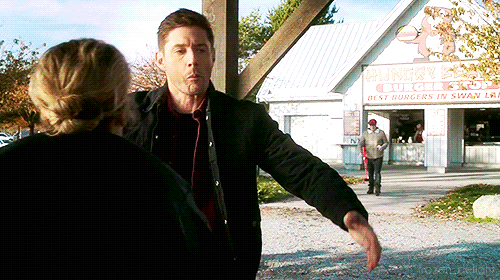
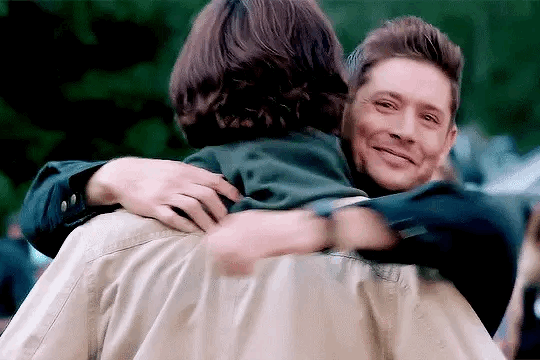
Because that's how Dean sees himself, as a shield for others, and then I thought about how Cas actually is the shield, and he's HIS SHIELD, specifically, the only one who's really there to protect HIM, which is why it hits so much when we see this:
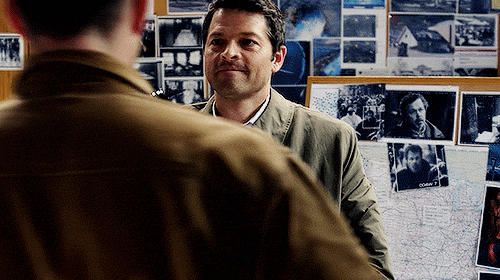
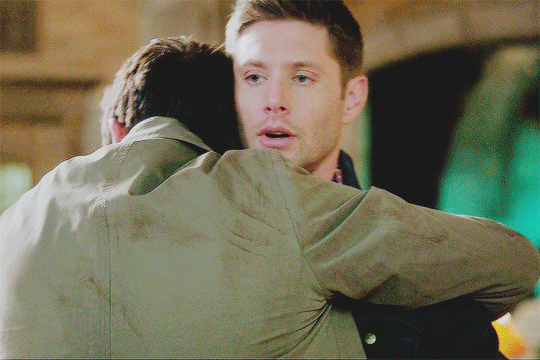
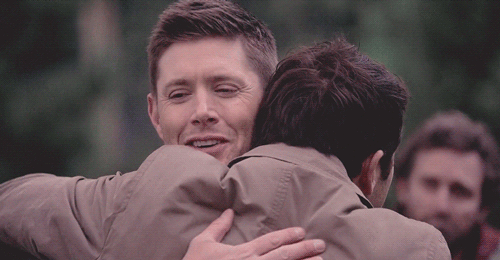
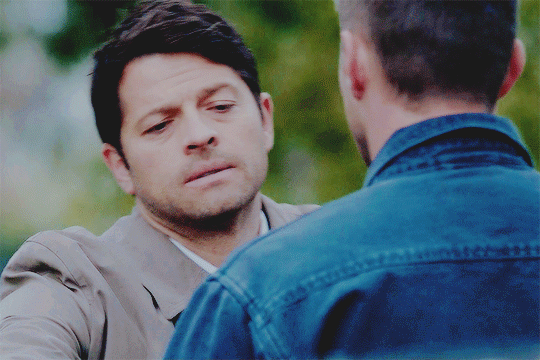
The way Cas wraps his arms around him, trying to protect him with his whole body--that he'd use as a shield and give up in a second if he could spare him from any pain and save him.
(for context: Dean was about to go use the soul bomb on Amara there, it was a suicide mission)
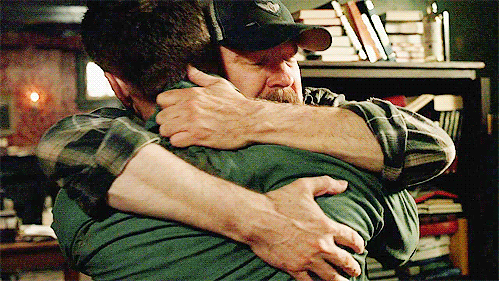
Bobby is another one that hits, he hugs him as the big hugger because he's his father, he loves him and he's actually here to protect him (and Dean LETS him -barely, but he lets him *and Cas* - in a way that he doesn't let Sam)
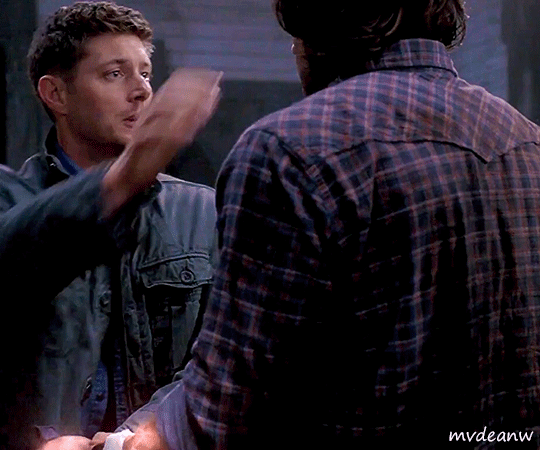
I watched a compilation of Sam & Dean hugs to check if i was right about it, but it's almost always Dean the big hugger with Sam, except when he's about to die or Sam sees him alive again after losing him.



Even then, Dean mostly tries to hug Sam as the big hugger anyway, with at least one arm, like a way to comfort him, making him feel protected, like his body language is saying "I'm here, I'm okay, I'm still strong, i can still protect you" (because their real father failed and Dean thinks it's his job).

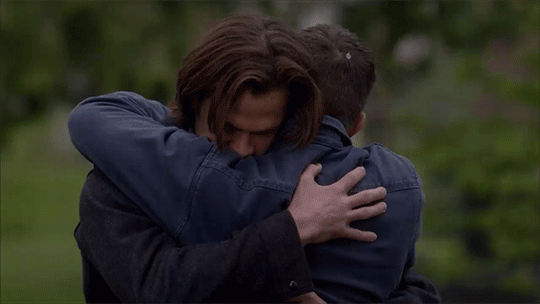
He rarely lets himself be the little one hugged with Sam, unless he's barely conscious. Which is why it kills me so much more now that in this moment (s14, when Dean was going to lock himself in the Ma'lak box cause he was possessed by Michael) and Sam has a desperate breakdown and punches him (to stop him) he forcefully hugs him as the little hugger, the way Dean always kept him, like a way of saying "I still need you to protect me, please don't do this to yourself".

In the scene below he gives Sam his blessing to do a dangerous (possibly suicidal) mission, and one of his arms is down, but the other one tries to stay up--he's forcing himself to do it and he struggles because he still wants to protect him, but (as the seasons progress) he slowly becomes more prone to let go.
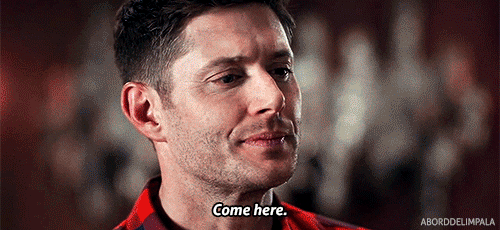
So in this view the hug dynamic becomes an indicator of how Dean sees Sam (and himself) and his protector role, how adult and self sufficient he considers Sam, and how much he lets people around him take care of him, lowering his walls and letting himself be hugged.
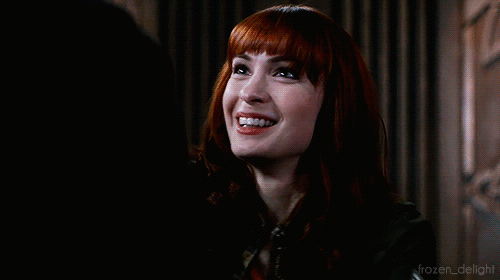
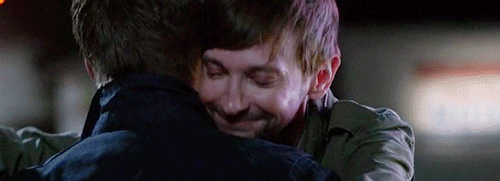
This is also why i think hugs from characters like Garth or Charlie are so special, because they're just like us: they see Dean and they just know that he needs to be hugged a lot, and that he's not used to it, so they just go for it-- and it's so normal and kind and spontaneous that Dean's just not used to it-- he doesn't know how to respond (especially with Garth, at the beginning, but as the seasons progress, he learns to, and he even initiates the hug eventually).
youtube
I love the hugs where they're 50/50 (one arm up, one arm down both), feels like they're equals, both taking care of each other. I feel like with Sam and Dean, this indicates a healthier dynamic, because Dean lets go a little of the role that was imposed to him and manages to see Sam as the strong individual that he is. But the same applies to 50/50 hugs with other characters, like with Cas, where I feel like it testifies how equals they feel in terms of being fighters, there's a show of respect of each other's strength that transpires by the gesture (which is even more astounding considering that Cas is literally a powerful angel).
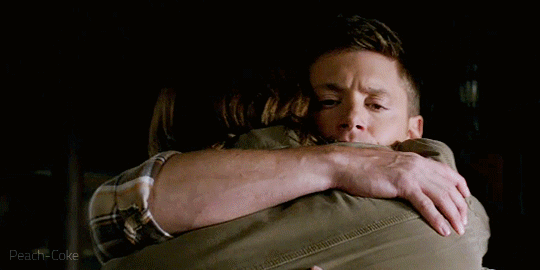
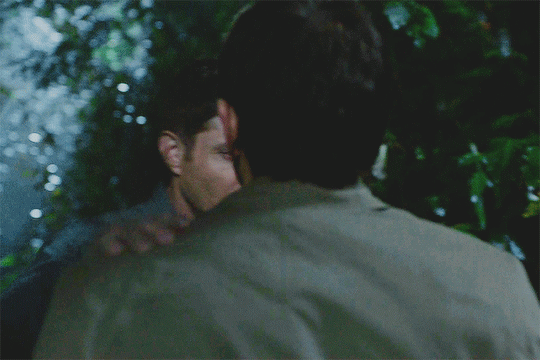
And just to end on a destiel note, I'd like to note the possessiveness and protectiveness of Dean (rightfully so) whenever he finds Cas after he thought he had lost him, and how that translates into his body/hug language:
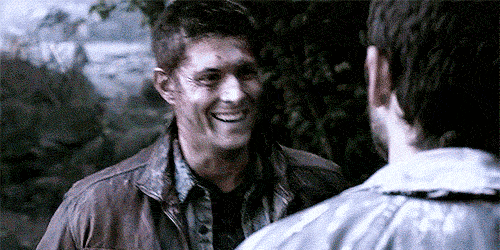

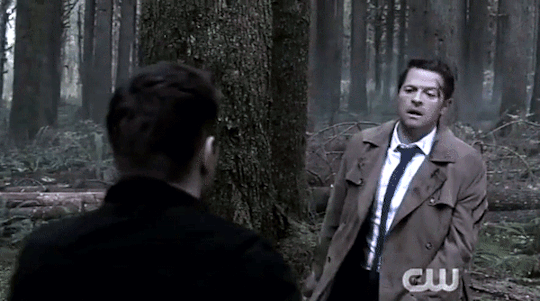
#dean winchester#spn#dean winchester character study#spn analysis#dean winchester analysis#dean winchester & hugs#dean studies#destiel#deancas#body language#hugs#dean winchester hugs#castiel#sam winchester#sam & dean#sam & dean dynamics#dean x cas#psychology#my thoughts#my interpretation#my analysis#spn gifs#dean winchester gifs#Youtube#long post#but it's mostly many gifs#no that's not true i also wrote a lot (but it's little paragraphs in between more gifs than the mobile app allows)#(I did it from the website to cheat)#(i hope it doesn't lag too much)
3K notes
·
View notes
Text
Genshin SAGAU, Creator of Teyvat, but not Humanity Part 1
Playing around with the idea of The creator of Teyvat, not being the creator of humanity.
Masterlist | Next Part
~~~
You were never much of a gamer.
Not that you disliked games of course, but it never quite clicked with you the way it did others. You’d try a couple of games on and off, but there would always be a point where it’d become boring.
Not that there was anything bad about the games themselves, you freely complimented the design and effort it goes into making these masterful pieces of art and code.
You just, weren't a gamer.
Until Genshin Impact
You can still remember the day you heard of it.
You were chatting with friends and one of them brought up this new game they saw a promotion for that they were interested in trying.
It was this anime-esque gacha game.
They showed you a couple trailers and promotional materials, and you must admit they were quite appealing.
However you didn’t intend to try it, knowing that you’d eventually drop it and move on.
But your friend still pestered you, claiming that there’s no harm in trying and dropping another game, after all it’s free anyways, so you’re not losing out on anything monetary.
Skeptical, you joined them in trying out the game.
And
Well
Let’s just say your friend got more than a couple of “I told you so’s” that day
It was beautiful.
The art, the music, the characters.
Everything about this game just, clicked.
You understand why people got so obsessed with certain games.
Why they would be willing to pay for things such as this.
Why this is such a large industry.
It’s, well it’s fun.
It was honestly quite frightening how quickly the game pulled you in.
You never understood the term “completionist”, until it started to apply to you.
Every quest, every domain, every achievement
You did it all
Every dialogue, every story, every entry in the archive.
You read it all.
You scoured the forums for bits of lore, and shrieked with your friend every time something new was dropped.
Genshin was all consuming.
It was honestly quite concerning, if it weren’t for the fact it was time gated with its resin cap and limited content, your outside life probably would’ve suffered.
On some level you probably knew that this was not normal. Your friends who were all gamers as well were never as obsessed over a single game as you were over Genshin.
But you reassured yourself, this is the first game that made you feel this way, its natural for you to go a little overboard.
I’m sure it’ll die down as I try out other games.
But you never really did.
No other game, no matter how popular or similar or highly rated.
Other games from Hoyoverse fared slightly better in terms of attention span.
But you always went back to Genshin.
Not that it bothered you.
Genshin was enough, considering you still had real world responsibilities to balance.
And that was that.
Until, well.
Until Fontaine.
You see, you’d always enjoyed the characters of Teyvat.
But you’ve never quite simped after them the way the fanbase did.
You admired their aesthetics and enjoyed their stories. But they never quite drew you in.
Even your main, was quite honestly determined by meta and whatever character you’ve managed to get your hands on.
There was never a “waifu” or “husbando”.
It was always the world and story that drew you in rather than individual characters.
Iudex Neuvillette was an exception.
The exception
He felt right.
You immediately knew you had to pull for him.
So you did.
And playing him was amazing. He was as meta breaking as you’d hoped and, well, you just liked him.
“Your first official Husbando” your friends would tease. You understand why they would go such lengths for a specific character now.
He was special.
He was a Dragon.
He felt, right.
You quite never understood why
Not until you entered the world of Teyvat.
That story,
Well,
That begins from the other side of the screen.
~~~
“I bet we can definitely open up a whole new sector in Fontaine if all goes well don't you think?” Hu Tao chattered as she and Zhongli strolled back to Liyue Harbor.
Zhongli hummed in agreement, only half paying attention to the conversation. He could tell Hu Tao noticed, since she was keeping the topic of conversation to light topics that anyone with half a mind could parse through. Only enough relevance so that he wouldn’t get lost in thought, but not so much that he had to focus on the conversation.
She was considerate like that, he knew since she had let many of his oddities slide, especially when he was still adjusting to mortal life.
Not that he was free from old habits mind you.
Zhongli doubted he would ever truly be able to blend into a crowd of mortal without some level of adept arts concealing his presence, however he was able to blend in enough so that the average nosy person was able to wave off his eccentricities a simply a facet of his personality rather than something deeper.
He cannot forget that it was thanks to people such as Hu Tao who were willing to let him in without many questions that allowed him to get to this point. Something he will be forever grateful for.
Be that as it may, it did not change the fact that some things will forever be kept secret.
His near encounter with the Hydro dragon for one.
Even from the other side of Qiaoying village where he’d made himself scarce, he could feel the amount of blessings placed upon the man.
He truly was favored by the creator.
Not that that was any surprise.
What was surprising was his own blessing.
Though much smaller, he still treasured the gift given to him by the creator of Teyvat.
Teyvat, after all, was a world of Dragons.
It was due to the advent of The Primordial One, did they lose their authority.
Not that many people knew.
Most people didn’t
The true History and creation of Teyvat was kept tightly wrapped, even the most learned scholars of the Akademiya could only infer at what truly happened, as well as the origin of humanity.
The true name of the creator was lost to time, only their title of the creator of Teyvat remaining. The mortals who lived on Teyvat daren’t give them another for fear of evoking their wrath.
They had plenty to be wrathful about.
Zhongli would only imagine his own rage, if anything similar happened to Liyue.
Imagine putting in centuries upon centuries of work only for an outsider to come in, destroy your work and reshape it for their own people. Before proceeding to have the audacity to name him as a contributor to their success and praise alongside such an usurper.
Just imagining it makes him angry.
That is why, the creator’s title is rarely evoked.
Names have power after all.
Names of gods even more so.
To evoke their name, their title, is to ask for attention.
Attention that would be safer left elsewhere.
Not that mortals knew the true reason.
The commonly accepted reasoning was that the creator of Teyvat has long turned their gaze elsewhere, satisfied with the current ruling of Teyvat, having entrusted their powers to Celestia and the Archons.
Zhongli would feel guilt at this blatant lie and rewriting of history if he could.
But he cannot, because to feel guilt would be to regret his actions and to wish something was different.
But he knew that he, along with all of humanity, Liyue Harbor, his Adepti and friends. They would not have existed, they would not have lived, has history played out justly.
The world is not just.
The world simply is.
He feared to an extent that the Hydro dragons would try to force a more cruel version of justice upon Fontaine, condemning them all as usurpers, when they had no idea, or even power over what had happened in the past.
Thankfully it seems that Focalors’s plan to integrate him into humanity worked. Stemming any sort of “justice” he may enact on humanity for the crimes of The Primordial One. In fact, he seems to have great fondness over humanity, absolving them of their sin and saving them from the prophecy that threatened Fontaine for so many centuries.
However, he knew that he was exempt from this mercy. Zhongli knew that when the time came, the Hydro dragon, or well Iudex Neuvillette would spare no effort in holding him accountable for his actions in usurping the original order of Teyvat.
Which is exactly why he avoided the man, dragon? as he did.
“-ello, earth to Zhongli, ”
Zhongli blinked, Hu Tao’s voice dragging him back to their situation at hand.
“Ah, my apologies, I seemed to have been lost in thought”
She clicked her tongue at him, “Aiyyaa, honestly Zhongli, I wonder sometimes if your age is getting to you, I was trying to get your attention for quite a while”
“Is that so,”
Zhongli couldn’t help but smile at her exaggerated groan.
“I was merely thinking about some old history,” he started, preparing himself to finish the history of Qiaoying village that he was telling Hu Tao on their way over.
“Oh no, there’s no need for that,” she waved off, a slight grimace on her face.
He knew how bored she was by the story the way over, so it served as a perfect distraction on the way back to stop her from questioning any further.
“Honestly a girl can only listen so much about the different varieties of teas and their subtle notes and flavoring before she has to burst yo know,” she complained.
“Well, the history of tea has a -”
“Oh look we’re almost there!” She pointed out, most likely in a desperate bid to stop him from droning on.
He was being slightly unfair to her, he knows, but it never ceases to become unassuming when people try to fake interest in a topic, only to regret it when they realize just how much there is to know about it.
Of course it can never compare to when someone has a genuine passion for the topic and wants to engage further, but those mortals are rare.
More often than not, he can use his vast knowledge as a smokescreen too, well, as Paimon would most likely put it. Bore people into leaving him alone.
He waves off Hu Tao as she bounces back home, and allows himself to take a stroll through the streets of Liyue Harbor.
The Lantern Rite was ending, another celebration successfully done under the hard work of the Qixing
He gazed around at all the sights, the lanterns, the food stalls, the beautiful atmosphere of people enjoying the celebration.
No
He could never regret what he did.
Not since it lead to peace and happiness like this.
And
If things are as he suspects.
He may never have too.
He feels it once more.
The glow of the creator's blessing.
He can feel it swirling within him as he steps through Liyue Harbor.
He wonders if they can see it as he does. Sees the beauty and resplendence of humanity.
Look, he wants to scream
They are nothing like The Primordial One
They are good, kind and beautiful.
Humans may not be your creation, they may not have originated from this world but that does not mean they do not deserve to stay.
But he doesn’t
First of all because he feels that screaming these things in the middle of a busy street may attract some weird looks.
But also out of fear, fear that any attempt to disrupt this fragile peace could lead to destruction.
Because it is fragile, it has only been a couple of years since the creator has turned their eyes to Teyvat.
Those who have been blessed have been careful in their own way not to destroy this chance that the creator has given them.
A chance to prove themselves, not only as people deserving of their attention and blessing, but as a people.
To prove themselves just as worthy of the dragons of staying in Teyvat.
Because they all know, in their hearts of hearts, that what the creator has created, they could just as easily destroy.
While some may tease him for his age, there is no denying that with age comes experiences that the younger generation may never know.
He himself, whilst having been born long after the disappearance of the creator, witnessed firsthand how it had affected the world.
How Godly remains tainted the earth for far longer than it used to.
How miasma and abyssal energy started to leak forth.
How Leyline disorders became more and more commonplace.
Teyvat was breaking.
It was falling apart.
But perhaps.
With this new chance, it could be fixed.
He could still remember the day the creator first turned their gaze upon Teyvat.
Or well, more specifically, the first time they turned their gaze on him.
He had heard rumors of an outlander from Mondstatdt making their way to Liyue. Tales of their feats and defeating Dvalin with the wayward Anemo Archon were as prevalent as talks about the upcoming Rite of Descension.
He had taken note of it of course, outlanders were rare after all, but he hadn’t expected this one to be quite, consequential.
Not until he met them.
He felt their approach funnily enough, the unbranded aura they carried within them. While he could’ve written it off as an aspect of their outlander status, internally he knew it not to be true.
He was far too young to have ever met the creator, or even the original dragons.
But he has stumbled upon their remnants.
Pure remnants, unlike the gnosis which have been twisted and altered by the time it had spent in the hands of The Primordial One.
It was, indescribable.
Free, yet grounded.
Unwavering yet fluid.
Swift yet languid.
It
It simply was
It was the essence of Teyvat.
The essence of the land he lived and fought and bled and laughed in.
How could he not worship it.
How could he not fear it.
He had felt Childe walk in with bated breath, distracting himself with his cup of tea to settle his nerves.
What did this mean?
Was this the end of Liyue, of humanity, of Teyvat?
Over the centuries people have accepted the creator’s complacency in the affairs of Teyvat.
What does it now mean that they have focused their gaze once more on this land.
Destruction
Salvation
He daren’t hope or guess.
But
Well,
The Traveler was kind.
They had no ill will towards the people of Teyvat.
While it was clear they had their own mission to stove for, they did not hesitate in helping those they can along the way.
If the creator has blessed one such as them, one so kind to humans, one with no ill will.
Perhaps.
A seed of hope planted itself in him, and refused to budge.
As time went on, the seed grew.
Hope grew.
The tiny seed of hope that he tried so hard to ignore and deny could be ignored no longer when he received a blessing himself.
He could still remember it so clearly.
It was a normal day, nothing out of the ordinary. He went to work, had tea, chatted with passersby.
There were no great feats.
No great revelations, or offerings.
Yet he felt it for the first time.
A blessing.
A pure, gentle, powerful blessing.
He could feel the sentiment behind it, weak as it was.
Relief, excitement, apprehension.
He wanted to cry, to pray. To thank them for giving him a chance, for giving the people of Teyvat a chance.
But fear held him back.
It still does to this day.
That’s the problem with gods, their pleasure and their wrath can often look the same.
Even as he compared notes with Barbatos and the Adepti, confirming that many of them have been given blessings.
While some like Ganyu, rejoiced in this blessing eager for a chance to prove themselves worthy of this world.
People such as him were still fearful.
Fearful of what this meant and what they wanted.
The straw that broke the camel’s back was when he realized that xiangling was also blessed.
Not that the girl knew, after all the creator was very rarely spoken of, only ever mentioned in ancient rites and the most descriptive of history books.
But she had the blessing, a human.
From that point he saw so many others, so many humans, mere mortals given their divine blessing and gaze.
An exorcist, an author, a member of the Qixing.
It spread across Teyvat, whispers as people soon realized that there was a god, an unknown god blessing them.
Granting them abilities beyond their visions, oftentimes enhancing them to levels beyond previously known human limits.
No one dared to say their name, they were insinuations, and speculations, but no one dared disturbed the fragile peace that has settled.
It is an understanding between those who have it.
Those who know, know and those who don’t are kept in the dark.
But it seems that the Creator has turned their gaze to Teyvat and to humans.
~~~~
Masterlist | Next Part
~~~~
Tell me what you guys think!
833 notes
·
View notes
Note
Hello! Hope your day is going alright. I was wondering if you have any advice for when all characters feel the same? Despite having different core traits and mannerisms, when I write them it always somehow ends up feeling like they're copy pastes of one another to me. I noticed that I've been having a hard time with giving my characters agency too which led me to wondering if that isn't causing the former issues.
Thank you for taking the time to run this blog and help so many people, cheers!
Writing Notes: Character Identity & Agency
Identity chart. Example:
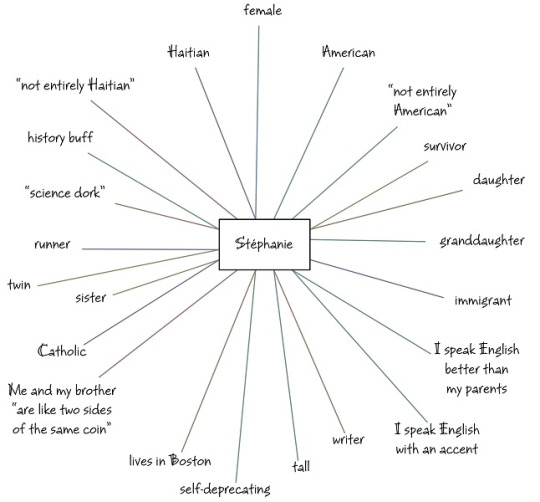
What parts of themselves are influencing their decisions in your story? Familiarize that part of their identities.
Try to maintain the truth of the group and to simultaneously think of your character as an individual.
Thinking about why your characters behave the way they do and why they make certain decisions is important to writing a good story.
The plot moves along because of the decisions your characters make.
Be honest with yourself and what you know and don't know, do some research and ask for help, you'll create more authentic characters that way.
Your Character's Agency. Some writers prefer to map out their story but allow their characters to help lead the story.
This technique is more often used by "pantsers".
A pantser is a term most commonly applied to fiction writers, especially novelists, who write their stories "by the seat of their pants."
The opposite would be a plotter, or someone who uses outlines to help plot out their novels.
Many writers fall into one camp or the other, though it's not uncommon for writers to try both methods from book to book.
Author Victoria Schade describes giving her characters agency:
...I kept stressing out about a specific plot point I couldn’t untangle, and over time my characters slowly revealed the answer to me. It wasn’t an “a ha” moment, it was a gradual realization, and when it all came together I couldn’t help but think, “It was there the whole time!” But that’s the beauty of letting characters have agency and giving them an active role in the writing process—they surprise you!
It pays off to let characters have agency, she has found, particularly in the drafting process.
WRITING TIPS. When creating a character, try to understand them so that their actions and words are consistent with their personality and history.
Who we are is at least partly hardwired, inherited from parents and grandparents.
A lot of those characteristics like how extraverted or introverted someone is, how open or private they are, how conscientious or empathetic or neurotic they are is there in a child’s brain.
Knowing those basic characteristics could help you understand where a person has come from.
But those traits are plastic; they are moulded by experience and especially childhood.
Writing a backstory for a character helps the writer make certain that even confident social behavior (from an introverted character) is different from the social behavior of an extravert.
No personality trait is better than another, extraverts don’t have easier lives than introverts, conscientious people don’t do better than slapdash people.
Everyone struggles with their own nature in the wrong settings.
Of course, writers delight in putting them in the wrong settings.
Understanding motivation is crucial to developing a character, most writers do this automatically.
They may have a plot-driven goal (solve the crime, deliver the ring, marry the hero), but they also have
personal motivations (revenge against a killer, loyalty to comrades, love or loneliness).
Example: You don’t want a shy, lonely character to suddenly propose a karaoke night, because the reader won’t find it believable. Maybe she has to be talked into it, dragged even!
When creating main characteristics, it’s worth jotting down a personality sketch and basic history.
Smaller characters are just as important.
It's okay if you don’t delve into their history much, but you don’t want them to be stereotypical characters, just ciphers for the plot.
These smaller characters are great opportunities to reveal something about the main character, as they are seen through their point of view.
Example: A confident person meeting a surly waiter might challenge them, or ignore it. An anxious person might blame themselves.
We are interested in people and how different they are from us.
Stories of extraordinary life experiences draw us in.
We want to learn about personality traits that we don’t understand, like psychopathy or obsession, which explains the popularity of true crime books and fiction about murder.
Human beings are varied and interesting, we like to understand what they do.
A death, a divorce, a lost job, a miscarriage, all lead to a fresh start—it’s a brilliant trope, because we all experience them in our own lives.
Characters are revealed to us as they struggle and adapt, make new choices, build new relationships.
People don’t move on cleanly; they trail the past around with them for years.
Allowing a character to experience doubts and fears going forward makes them more relatable, more realistic.
Our senses produce a lot of memories.
The most evocative are smells.
We can activate memories from our childhood, even babyhood from a scent.
Example: Smoke from pipe tobacco can evoke someone's grandfather, who they hardly knew because he died when they were just a toddler. But the smell could bring back the sound of his voice and his bristly beard, huge leathery hands.
The "Read a lot" Writing Tip:
Read psychology articles and real-life stories, just to enrich your fiction.
As writers, we collect stories.
Sources: 1 2 3 4 5 ⚜ More: References ⚜ Writing Resources PDFs
Thanks so much for your kind words! Try some of these tips and see which ones work for you as a writer, or perhaps for that specific story you are currently writing. Some writers don't find it necessary to give their characters agency, but it can work at times. When characters start to feel "the same", one technique is using charts like this, or templates, just to help with keeping track of your characters' traits and further differentiating them from one another. Hope this helps & have a lovely day/night as well.
More References for Character Development
Some Writing Worksheets & Templates
#writeblr#character development#writing notes#fiction#dark academia#light academia#creative writing#studyblr#lit#original character#on writing#writing prompt#writing advice#writing tips#writing reference#spilled ink#writers on tumblr#literature#writing resources
99 notes
·
View notes
Text
From Hound to Hawkeye: The Evolution of Vi's Protector
I remember when I first saw the interview lines from Amanda Overton post-S2 talking about Vi's character arc this season and feeling a little confused by them at first. Who is Vi when she doesn't have anyone to protect? The type of person to fall in love. Which while beautiful, begged the question in my mind; what about Caitlyn?
But the more I've thought about it in the interim the more obvious the answer has become. Vi doesn't have anyone left to protect because Caitlyn doesn't need Vi to protect her. In fact, over the course of the show Caitlyn undergoes a journey to become Vi's protector. Specifically, Caitlyn steps in and fills the hole, that need for love and protection, that was left behind after Vander's death in Vi's youth.
And once I made that connection it was suddenly really easy to start noticing all of the parallels between Caitlyn and Vander, especially when it comes to their interactions with Vi.
Caitlyn's journey on the path to becoming Vi's protector started in Stillwater, when she first freed her, but this arc doesn't really kick off until after Vi gets stabbed while fighting Sevika at the end of Episode 5 and she's then forced to depend on Caitlyn for safety, on account of the whole being stabbed thing. And that's when the Protector Arc, and the Caitlyn/Vander parallels, begin in earnest.
~Both lecture Vi for her impulsiveness before/while tending to her wounds~
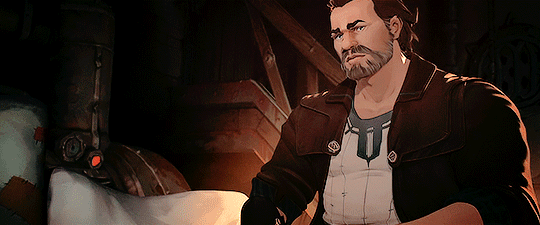
Even this early on Caitlyn already cares for Vi's safety (a trait we quickly learn applies to most people) and we get the very obvious, show makes sure we know it's a parallel to Vander, Caitlyn telling Vi that she has a good heart.
This is quickly followed by her leaving to find Vi some type of medicine which leads to the next big parallel between Vander and Caitlyn.
~Both sacrifice their weapons in a dangerous situation to keep Vi safe~

Vander drops his gauntlets on the bridge in the middle of the fighting (even if it was dying down), sacrificing them in order to pick Vi and Powder up and take her to safety. In the same vein, Caitlyn sells her only firearm in the middle of a dangerous environment while tracking down a terrorist with almost no bureaucratic support to get Vi a cure for being stabbed.
Shortly thereafter we get the whole escape from Silco/finding Jinx sequence which isn't relevant except for how it leads to the next parallel when Vi and Caitlyn get captured by the Firelights.
~Both attempt to sacrifice their freedom for Vi's~
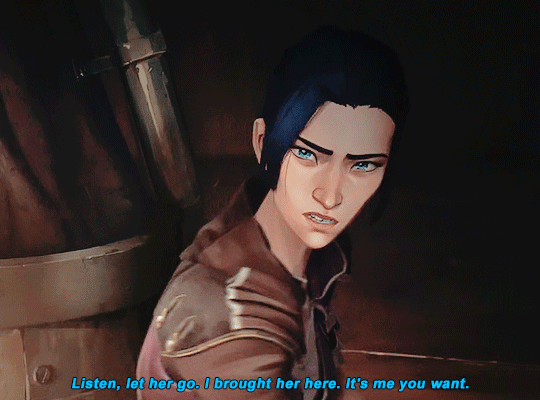
Now, Caitlyn's already captured here but I think it counts. Before the reveal that Vi's on good terms with the Firelights, Caitlyn is seen fighting tooth and nail to get them to release Vi and keep her in Vi's stead. Vander on the other hand willingly turned himself over to the Enforcers in Vi's place to keep her from having to spend who knows how many years in Stillwater.
~Both went to bat for Vi against politically powerful opponents~

Caitlyn immediately goes toe-to-toe with Cassandra when she makes it back topside, demanding assistance and offering reproachful glares whenever someone says something remotely offensive about Vi (honestly everything with Ambessa also fits here but she's later). Vander on the other hand was trying to juggle Silco's schemes (that he didn't even know about), Marcus' impudence, and Sevika's betrayal while trying to keep Vi's life unaffected.
After this there's only one major parallel between Caitlyn and Vander until the end of S2A2, but there's some other fun Protector Things to talk about in S2A1. Specifically, how Caitlyn steps up and becomes Vi's protector in the wrong way during this act.
There's this specific old-timey usage of Protector that's popular in like... period romances(?) I was a lit major but I didn't specialize in period romances lol to refer to an influential individual (typically a man) who bestows financial and social protections on someone (typically a woman) without granting them the legal protections of marriage.
This is, essentially, what's happened with Vi and Caitlyn in the first act of the second season. We know that Vi's not living with Caitlyn but she also doesn't seem to be working, so the logical conclusion is that Caitlyn is handling her accommodations. In terms of social we know Caitlyn went so far as to threaten to pull her family's funds from the city if they didn't, basically, treat Vi as an equal citizen instead of the sister of a terrorist. But they aren't together romantically and they aren't living together with any of the implied legal protections one might have as an actual ward of Caitlyn's house.
Which leads up to the next one:
~Both lash out in their grief at the wrong people~

And more specifically, they lash out at the wrong person who was sort of a tangential cause in the death of a loved one. Vander attacks and blames Silco for Felicia's death and while she's primarily holding herself responsible, Caitlyn is also aware that she would have stopped Jinx without hesitation if she wasn't Vi's sister; if Vi hadn't made her second guess herself and show mercy... well Cassandra might be alive.
There's also a very specific parallel between S2A2 Caitlyn and Post-Bridge Vander. Both allow an outside force (the Enforcers/the Noxians) to have unfettered access to the Undercity in the hopes of preventing escalating violence, only for things to continue to get even worse.
~Vi is able to pull them from the dark/reestablish their humanity~

When Vi reunites with both Vanderwick and Caitlyn in S2 Act 2 they've both completely lost themselves down darker paths. Vander's mind is being destroyed by Shimmer and he barely remembers he's a person and is largely just Warwick at this point while Caitlyn is lost in a sea of guilt-driven revenge and is donning the title "Commander" like a cloak of self-flagellation. And Vi's able to cut through Warwick to Vander and The Commander to Caitlyn because of their deep rooted love and need to protect her.
Then we get Caitlyn betraying Ambessa and the fight at the commune and I'll come back to this with the last parallel but first I wanna talk about the decisive moment where Caitlyn became Vi's protector, for real this time.
~Both choose to sacrifice revenge in order to save Vi~

During the fight at the commune, Vi is horribly, life-threateningly injured. As folks have noted before, Jinx gives Caitlyn a clear shot at her back while she's distracted (while there's enough chaos for it to be realistic for her to get caught by a stray bullet) and Caitlyn completely ignores her in favor of rushing to Vi's side. Plus she continues to put aside her feelings about Jinx in order for them to get Vi topside safely, and eventually allows Vi to free her when she willingly surrenders. Meanwhile, Vander pulled the same sorta deal in Episode 3 when the factory was about the blow up. He had a moment he could have gone, was going to go after Silco but realized the building was collapsing and Vi was still trapped inside after having a beam dropped on her. Naturally Vander rushed to save Vi, which allowed Silco to escape.
For Caitlyn, however, this is the exact moment she basically takes Vi properly under her protection. In fact, going back to the "old-timey romance novel" version of Protector. The way in which Caitlyn allows Vi to free Jinx, in addition to the fact they are living together post-canon, show that Vi now has legal protections and those protections come from her implied position as a Kiramman.

More to the point, the way in which Vi frees Jinx is reminiscent of how Caitlyn herself freed Vi back in Episode 5. With Caitlyn manipulating the pieces behind the scenes since Vi wasn't really aware she'd been granted Kiramman privileges yet. But to summarize:
Both were somewhere they weren't really supposed to be, but there wasn't anyone who'd question them (Caitlyn because she's a Kiramman, Vi because Caitlyn removed all the guards)
Both freed a prisoner unauthorized knowing hoping that someone higher up would have their back (Caitlyn knowing Jayce would have her back and Vi hoping Caitlyn would be willing to let Jinx help)
Both did indeed have someone higher up the food chain keep them from getting in trouble (Jayce covering for Caitlyn to Marcus and Caitlyn coming down to the cells to make sure she found/freed Vi before anyone else)
Another point in the "this is where Caitlyn becomes Vi's protector" agenda, but ever since that very first scene of the series on the bridge, Vi's always worn some sort of wraps right up until she wakes up in S2A3 in Caitlyn's bed.
Aka: she can finally put her weapon's down, because she's found herself placed firmly under Caitlyn's protection, which means she's finally, fully safe.
And then for the final (and this parts' going to be a dozy so buckle in) we can hop back to the battle at the commune and Caitlyn turning on Ambessa. And what I really love here is that Caitlyn, who has spent the last several months being manipulated at literally every turn, finds one single earnest, honest person again and is like
~Both are willing to start a war in order to protect Vi~

This parallel actually goes a little nuts. Because not only are both of them willing to start a war to protect Vi and her family, with Vander refusing to give the kids up to the Enforcers and nearly starting the civil war almost a decade early versus Caitlyn who refuses to give up Vanderwick real full circle moment here to Ambessa and Singed and actually starts a war with Noxus over it. No, they are both nearly killed in the fallout while taking a knife to the gut from someone they used to trust (Silco/Ambessa) after getting betrayed by someone they thought they could (Sevika/Maddie).
And Caitlyn actually does have to start and finish said war in order to protect Vi. Which brings me to my final point, which is actually something I've seen several complaints about but was really important for Vi's character arc.
Caitlyn needed to fight in the war without Vi. With Vi at a considerably safer location, all things told. Because an important part of Vi's arc is that she's just a normal girl who keeps getting caught up in matters far larger than her when really all she wants is to keep her little family safe, only to have it tragically clawed apart again and again.
So there are two parts to this. Firstly, why it was important for Vi to not need to be there. Because time and again Vi's watched as she'd failed to save her loved ones. Been feet away from them as they were brutally killed in front of her. Her being there hasn't ever been enough to save anyone. But with Caitlyn? Who's protecting not just Vi's fragile mortal form, but her battered, bleeding heart? Caitlyn didn't even need Vi there to come back alive (hurt, but alive).
Building from that we then circle back to the fact that, again, Vi's just your average girl from down in the lanes. There's a reason she nearly has a panic attack when she's sitting in on the war council and realizes how bad the situation is. And it's okay. In the end, Caitlyn and her people (well, mostly Mel) are able to handle Ambessa while Vi's allowed to basically focus on a family matter putting Warwick to rest with Jinx. Aka: Vi isn't responsible for dealing with the big major catastrophe and doesn't have to make it her priority. She can trust that Caitlyn's taking care of it and focus on taking care of her family, the thing she's wanted to do the whole time regardless of how it might have turned out.

While they don't really have a ton of screen time once they get together, the two scenes we do get also showcase this change in dynamics. Especially since, given Vi's affinity for fighting, most of the protection Caitlyn is providing at that point is emotional.
I just mentioned how Vi nearly had a panic attack in the war council, but note how it was nearly because Caitlyn immediately picked up on it (like, it took less than five seconds) and reached out for her, in an official, public setting mind you, to hold her hand and reassure her.
The final scene lends even further to this. Caitlyn is clearly hard-tuned in to Vi's emotional state. She's smirking and running off to see her after hearing her hum like, one line, clearly excited to witness some sort of levity out of her. And after Vi explains though Caitlyn offers some fairly non-evasive comfort (resting her head against Vi's shoulder and gently encouraging her to open up if need be) which serves as an invitation for Vi to choose to take more of said comfort, which she does, physically at least.
And it's such a perfect culmination of their respective arcs. Vi's a Lover, who's been forced to don a Fighter's mantle for years until nothing of her was left. While Caitlyn is a Fighter Protector who spent her whole life locked up in a gilded cage, desperate for more but constantly told her only role was to dance and sing for her public.
In the end Vi's allowed to start piecing herself back together, figuring out who the hell Violet is, while Caitlyn finally has a partner she can trust and rely on who does the same for her in turn.
Someone who sees her as an equal and loves her for herself, someone she can safely hand her heart over to.
And that's for both of them.
#Arcane#Arcane Analysis#CaitVi#Caitlyn Kiramman#Vi Arcane#All gifs courtesy of ArcaneGifs as linked#I need you to know it took an ungodly amount of self control not to end this with...#“and in conclusion that's why I say Cait's a Daddy Dom”#And then I realized it was also a pun and it got easier
139 notes
·
View notes
Text
Insights on Elven
While stuck in bed being ill I went completely off the deep end while trying to understand the use of letter-doubling in Elven (spoiler: I think it's a feature of fusional language). I ended up spending two days collecting canon phrases with official translations, retranslating it myself, and then applying each bit of knowledge to the formation of other words and phrases... and I think I've stumbled into a few insights.
First off, the word "vallaslin". We know this means 'blood writing', and we've always assumed the 'lin' is 'blood' and 'vallas' is 'writing' -- and up until two days ago I thought this too. But the more examples I dug up the more I think it's actually 'val' that means blood as a root -- though not necessarily in terms of violence. I believe it originally referred to mortality. We already have use cases of "vallas" meaning "life" in canon (Vallasdahlen: "life trees"), but I think the most damning evidence comes in Veilguard, where an Elven Rook will comment that the word Anvallenim means "womb".
an (place/location) + val (mortal/physical life) + len (people, n.) + im (him, become) = where mortal life becomes.
I think the real root of the word vallaslin is exactly what Solas says it is: a chattel brand. val (blood/physical) +las (have) lin (person).
Second insight was the word 'lath': it's used to refer specifically to a person in physical form. Over time, it expanded to encompass feelings that involve the physical form (eg. love and sex). The World of Thedas vol 1 actually lists two definitions for it, and that first one was really pulling at me when I read it:

Some of Solas' banter with Cole may even confirm this: "Have you felt no interest in women since you came through the Veil?". Spirits are singular in purpose and don't reproduce -- they probably do not fall in love, need, or have sex.
Leaning into this assumption, I found that the presumed translation of 'ath' by the illustrious fenxshiral ('taking the characteristics of' or 'embodiment of') not only works, but actually helps clarify a number of other words. Like, 'athim' for humility. ath (relating to physical/human) + him (become). With so much commentary about the limitations (and consequences) of physical form, and the constant struggle to become better and more powerful in it, the origins of the word would seem to reflect the views of the culture it emerged from.
I think the "L" in "lath" is borrowed (or implied) from the words for 'people' (as in group, not capital-P-People, which is 'vhen' or 'Elvhen'), depending on use). This would make "lath" very literally "love of being".
Along this same path, we know 'eth' is canonically used for "safe". I think it can also mean 'trust'. This would make "lethallin" translate more literally to 'trusted person': friend or kin.
This would also clear up a currently-untranslated word spoken by Solas' spirit sentinels in Trespasser. When you approach, you're greeted with, "Atish'all vallem, Fen'Harel elathadra."
The only other time we see the "adra" at the end of a word is when you're greeted by Study in the Vir Dirthara. They'll greet Sera, or an elf Inq, as "honoured elvhen", or, "mirthadra elvhen". Mir has been used as a root in words about rebellion, fighting, or weapons -- and that tracks, given that the first thing everybody did upon getting bodies was start a war. If the "th" is coming from my interpretation of "lath/leth", that would make the "adra" apply a concept to an individual.
Honour + physical being + applying base term to that being: honoured.
Spirits embody a singular idea or feeling - they're only ever spoken of in that way. Once they began taking form, they'd need an entirely new vocabulary around the existence of a spirit who is not a spirit -- especially when referencing a feeling/state/idea as a personality trait rather than their whole existence.
So, that spirit guardian isn't saying "peaceful welcome". It's saying, "(come) in peace, those-who-became-physical". That untranslated word, "Elathadra" would be something like, "those loyal/close to the Dread Wolf".
"Peaceful greetings mortals; loyal of Fen'Harel".
92 notes
·
View notes
Note
What is your stance on the "Elsen is one guy who cloned himself a bajillion times" comment from the 15th anniversary livestream
My stance is that I respectfully disagree (for lack of a better term). Since “all elsens are clones of one person” wasn’t ever stated/explored in-game, I find it more fun to explore other Elsen origins for my projects instead. Mortis Ghost has also said in the past that people are welcome to play fast and loose with lore, and that’s what I was doing before I was ever introduced to the clone discussion. It’s easier for me to ignore that newer addition than to overhaul my original ideas, so that’s what I’m doing. I have no issue with people who decide to use that lore for their own works, but it doesn’t apply to mine.
With that being said, what’s MY lore for Elsen? For me, Elsens as we see them in-game are the result of 3 things:
Human’s evolution after the “apocalypse”. Elsens are what Humans are in the far future, as the lingering effects of the apocalypse (cough cough radiation) changed the very essence of what Humans are from the past.
Hugo’s influence as a “god” of this world. What we see is what Hugo specifically makes, so Elsens are the cartoony square-headed humanoids because that’s what we are made to perceive by Hugo.
The Batter’s/Protagonist’s perception. They all look the same because it is just easier for them to look the same. It is unnecessary for them to look any different than each other to the Batter, so we barely see any differences.
In my games, “Tiny Terror” and “Project GoldFinch”, the Elsen are more visually different than the original OFF’s because they are not filtered through the Batter’s practical lens. Non-important NPC Elsen are intended to have more variety, because they are supposed to be more individualized than what the Batter saw. Now I can’t say “everyone’s different” because I think I’d die if I had to make every NPC unique, but I’m trying to change up certain details so you’re not just talking to the same Elsen in a dress-shirt and tie.
“So, that’s how they look, but how are they made, if not cloning?” Glad you asked, I have a few explanations that usually (but not definitively) depend on which Zone they reside in!
The Zone’s Minimum Quota: Each Zone has an undefined number of Elsens that have to exist within it. There can always be more than the set number, and there usually is in any given Zone, but if a death of an Elsen would mean going under, then a fully adult Elsen will appear in another area once that death occurs. This new Elsen will have a basic knowledge of living, but will have to be taught to do specialized tasks. This is more common in Zone 3 than the other Zones, and it's the reason Enoch’s sugar industry has been sustained for so long.
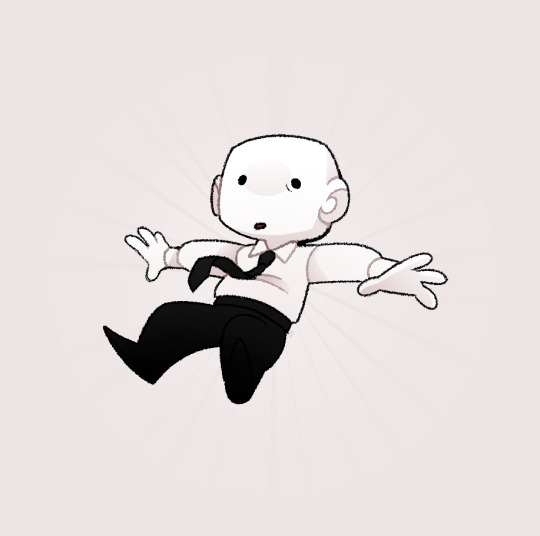
Cloning (via the Big Elsen in the Room): YES OK I have a cloning piece of my lore too, but it’s not exactly what Mortis Ghost described, so I don’t count it as the same. This version of cloning is heavily inspired by tzalmavet’s idea of the Big Elsen. Sometimes normal-looking Elsens will grow and slough off of the Giant One (that I have dubbed Biggs for my story). Some of these Elsen are kept in the Room, but most are sent to the larger Zones. Unfortunately the ones that are sent away don’t survive for long outside of the Room because of genetic instability caused by leaving and the rapid mutations that results from it. All of the Elsen that come from Biggs are genetically the same despite any differing mutations, and consider themselves siblings. They can identify each other as such even if they are meeting for the first time.

Creations of the Guardians: Guardians can create Elsens if they choose to excerpt the massive amount of energy needed to make one. This was done mostly in the beginning of the Zones, before the Quota was established. It is very impractical to perform now that there are other easier ways Elsen can exist. The creation ritual requires “scaffolding” (usually made of plastic, metal, or meat), and a Guardian to infuse energy into it. The scaffolding + energy will create an Elsen with whatever features and knowledge the Guardian wishes to give them. Japhet was the Guardian who created Elsens using this method the most, which is why he considers the Elsen of Zone 2 his children (even if not all of the Elsen within the Zone are made by him anymore).

The Traditional Way: Elsens can just make other Elsens the same way Humans can make other Humans, though infertility rates are VERY high in most of the Zones. Zone 3 is pretty much completely infertile, it is very rare to see a child in Zone 1, and Zone 2 has the most children with enough to have a small school. Elsen babies grow and mature at the same rate as Humans do.

There are also miscellaneous "Special Cases". Some of my Elsens have unique origins separate from the ones I listed above, but I’d like to save the spoilers for my game to when it comes out, haha!
That's all for now, I hope you found my statement and lore explanation entertaining! I am excited to share more in the future.
#PGF#Project GoldFinch#PGF Dev#tiny terror#TT#elsen#off elsen#off elsen oc#lore#story lore#oc lore#game lore#off#off fangame#offfangame#off mortis ghost#elsenoc#elsen oc#fan oc#off fan oc#off lore#oc#original art#original character#fanart#off japhet#japhet (off)#elsen off#elsen (off)
95 notes
·
View notes
Note
Is mbti pseudoscience ? Also what makes a term pseudoscience ? Is it the people involved? Lack of empirical evidence? Inability to replicate the results?
this is called the demarcation problem and philosophers of science have not settled it. i find this debate trite because it's generally framed around ahistorical, apolitical, asocial notions of 'science' as a set of disembodied ideas rather than as a family of knowledge practices occurring and evaluated in specific social contexts. for example, if we call phrenology a 'pseudoscience' we end up making nonsense of the historical observation that phrenological ideas were part of scientific discourses, practices, and experimentation throughout the nineteenth and twentieth centuries. people measuring skulls and trying to map out localised brain functions were engaging in scientific activities; scientific inquiry is capable of producing ideas that are wrong, racist, internally contradictory, &c. one of the main ideological functions of the label 'pseudoscience' has been & continues to be providing a foil for its counterpart, the ideal of 'science' as an inherently noble and truth-producing activity.
it's dangerous to reify the sort of dichotomy that doesn't permit for the existence of scientific error, bias, or ideological taint; it also obscures the internal logic of previous modes of thinking and epistemological frameworks (bloodletting was not just something doctors did because they were stupid; astrology historically depended on particular cosmologies and philosophical axioms) and makes it extremely difficult to say anything worthwhile about practices and ideas that have been designated 'scientific' or 'pseudoscientific', 'orthodox' or 'heterodox', in different historical moments and places. it's easy to see the designation 'pseudoscience' as a neutral or even politically astute denigration of bullshittery or charlatanism, but consider also that powerful institutions, individuals, professional guilds, and states are just as capable of slinging accusations of 'pseudoscientificity' at those they wish to marginalise for various political and ideological reasons. one recent example of this is the fairly contentious argument over the basic and unfortunately true assertion that many respiratory illnesses, particularly covid, are airborne. the process of deciding whose ideas are bunk, and whose are proper science, occurs in social context just as much as the formation and dissemination of the ideas themselves does.
anyway if what you mean is "are the mbti categories real / fixed / universal human 'types'" then the answer is no, definitely not, it was always a philosophically unjustified taxonomy-forward attempt to bring jungian psychology to the masses that caught on with hiring departments and corporate consultants, and that more than a few people have compared to a kind of 'updated' astrological discourse on the 'personality' expressed in today's scientifically fashionable language rather than yesteryear's. now see if every psy-scientific discourse to which a similar critique applies were to be described as 'pseudoscience' then we would have an awfully hard time explaining what exactly are the professional activities their exponents are engaging in all day, and meanwhile we would have very handily preserved the fiction that there is some other, nobler, properly scientific discipline of psychology magically free of all such inconvenient history and conceptual baggage.
192 notes
·
View notes
Note
it kinda sucks that you hc a canonically pansexual character as gay (clef)
i deliberated not answering this one bc i dont rlly mean to get into representation discourse or w/e during pride month of all things but i think the sentiment behind it is very fair so i feel bad ignoring it.
firstly, i think it needs to be said that clefs "canon" romantic orientation is very much just, whatevers funniest or most poignant for what youre trying to do with him. i understand the sentiment, there are characters in scp who are queer in a very specific and straightforward way where i'd also be upset if people erased that about them, but clef is not that guy. he is probably the single most contradictory character across the entire wiki, and everyones got a bit of their own take on him.
secondly, to defend my own take a little, i don't even really see clef as strictly homoromantic. i think when applying queer labels to fictional characters one tends to kind of treat them as these ontological, prescriptive truths, rather than how labels are used in real life, by the individual themselves to approximate their lived experience.
what i'm trying to say is i don't think clef the character, at least the version of him i'm most fond of, the fifty something year old reformed casual homophobe from resurrection and co, really knows what the term "pansexual" means, or "mlm", or "demiromantic", which are other words i'd use to describe him if i were using the prescriptive approach.
i think clefs relationship to romance is deeply complicated and not something he spends a lot of time really thinking about, and in practice, despite the theroretical breadth of his capacity to be attracted to other people, he's really only attracted to men, which is to say one particular man who also just so happens to be dead, so there's no point in really dwelling on it.
#hope this didnt come off as too snide or anything i just feel like this is a semantic debate more than anything#calling clef gay in that context just worked better 4 the joke i was trying to make‚ my general headcanon for him tends to veer closer to#“unlabeled mlm”#but i also dont think he dates women at all in practice. for reasons he also doesn't like to dwell on#anyway. happy pride! i love you n if you see clef as pan thats so fair and i dont even necessarily disagree with you#i just think hes old + has issues#not art#hc tag
158 notes
·
View notes
Text
my fav thing about prefect luminary is that even though he is... very different from the other alkaids, he is still Very Much So an alkaid. the innate traits are there, it's just that different ones are expressed because of his upbringing and environment.
pl cares about optimization and hates wasting time and resources. the same is seen with most other alkaids and their desire to learn new skills and achieve their goals in an almost perfectionistic way. this is especially seen with modern alkaid. there's an odd, reoccurring trend where pl seems to use this as an explanation as to why he doesn't just kill people or destroy planets for the hell of it or to prove a point. it's wasteful. of course, this doesn't always apply and the empire has messed him up immensely, but my own theory is that the innate kindness each alkaid has is mixed in here somewhere. that pl subconsciously uses resource management as a means to justify it. key word being subconsciously - pl does not strike me as being self aware in the SLIGHTEST.
speaking of an alkaid's innate kindness, pl is a very interesting case where he seems almost defensive if accused of showing kindness. and he always has an explanation. "this is just one exception" or "this is just to be resourceful"... the only way i can even try to describe it is like... he's almost, kinda tsundere? which makes sense. if you take an innately kind guy and put him in, well. the empire. that will likely be the outcome.
pl almost seems bored by his job - i often joke about this, but it's true. there seems to be a lack of fervor in his actions compared to the other empire boys. when stuck in the same position for years and years with no upward mobility - and with no personal passion for the job - you get an alkaid who lacks freedom. and when an alkaid lacks freedom, much of his personality is being restricted since that's a key component to who he is and what he stands for.
pl is sarcastic, blunt, and sassy. every other alkaid is as well, and i'd go as far to say this trait is the only one that perfectly aligns with the other alkaids since it's allowed to be expressed in the empire. though, with the other alkaids, it seems to be toned down with strangers or anyone he doesn't know too well. this is compared to pl who will straight up write sarcastic and blunt emails to coworkers and subordinates.
pl only feels real emotion when it comes to mc. this is pretty similar to modern alkaid. pl and modern alkaid have the most similarities in terms of emotional repression. both have been trained to repress who they are (because of the empire and tammy's organization respectively), and as a result, are deeply emotionally constipated individuals who see mc as the color that paints their monotone lives. the difference is that modern alkaid has a family who does genuinely care about him, a relatively normal society, and the freedom to pursue what he wants when he wants. so he's more well adjusted despite his issues. pl, on the other hand... lol.
i'm kinda curious to see how other innate alkaid traits get twisted with pl and the empire. specifically would be curious to see how an alkaid's tendency to overthink and to protect comes into play. very, very curious actually!
#lovebrush chronicles#prefect luminary#alkaid mcgrath#pl brought me out of my brief dragon age hiatus i think he's neat and insane. mwah.#he gives tenured professor who doesnt care about getting fired energy and i love it lmao#addy rambles
80 notes
·
View notes
Text
On Appalachian and Southern Stereotypes
After seeing some people leap at the opportunity to insult and further harm us under my posts, even by obviously leftist accounts, I wanted to address some of the most popular stereotypes of our region.
Not as an excuse. There are many negative, violent and otherwise harmful features of the American South. We have a horrific history especially in terms of the violence we inflicted and continue to inflict upon the Black community that cannot be forgotten, and, as a culture, we do need to pay our dues.
But maybe this will help y’all apply some nuance to the situation and understand that we aren’t all your enemy.
Stereotype 1: Everyone is a Republican Racist
Absolute horse shit, my friends. There are people like me all over the south and in the hollers. We just get drowned out by the fascists, and it is all by design.
In my home state of North Carolina alone, they are working tirelessly to make it impossible for young, often liberal (if not outright leftist) voices to be heard. They specifically target regions with heavy POC populations.
As recently as May of this year, the North Carolina Supreme Court overturned their own previous ruling which once made gerrymandering illegal. This allows Republicans free range to draw their congressional lines wherever benefits them most.
Meanwhile, Roy Cooper, our Democratic governor, has been in office since 2017.
Gerrymandering is a real problem, and it reflects the worst of us. But it does not reflect all of us.
We are a working class, pro-union people.
We are coal miners and mill workers and farmers.
We took up arms against the government and fought for our labor rights during the Coal Wars as recently as the 1920s.
We bled for labor rights at the Battle of Blair Mountain.
It’s a myth that you keep perpetuating that we are all closed minded, bigoted regressionists. It diminishes the efforts of everyone from the coal miners to people like me while we try to make the region a better place.
It actually only worsens what you say that you wish you could “saw off into the ocean.”
That's my home you're talking about.
Stereotype 2: Everyone is Obese
36.3% of the overall population of the Southeast is obese. This is true.
Have you considered why that may be? For starters, Southerners are more likely to be uninsured compared to individuals living in the rest of the country.
"Among the total nonelderly population, 15% of individuals in the South are uninsured compared to 10% of individuals in the rest of the country."
Partially because they didn't even expand the same Medicaid benefits to us. and partially because we are just so fucking poor.
17% of the American South is below the poverty line, compared to 13% in the Midwest, 13% in the West, and 13% in the Northeast.
Percentages under 5% may not seem like much, but when you consider 1% of the total United States population is around 3,140,000 people, yeah, that adds up real quick.
How does this relate? Well...
Mississippi has 19.58% of its residents below the poverty line, and a 39.1% obesity rate.
West Virginia has 17.10% of its residents below the poverty line, and a 40.6 % obesity rate.
Kentucky has 16.61% of its residents below the poverty line, and a 40.4% obesity rate.
Are you seeing the trend?
We, generally speaking, are more likely to be unable to afford to feed ourselves wholesome foods, and we are less likely to be able to afford medical insurance--two things that are obviously important to maintaing good health and a "healthy" weight.
By the same token...
Stereotype #3: We're All Uneducated
The South and Appalachia are some of the lowest ranked in terms of educational funding and spending per pupil in the entire country. We don't even break the top 30 on the list, y'all.
49. Tennessee at $8,324 per pupil 47. Mississippi at $8,919 per pupil 45. Alabama at $9,636 per pupil 42. Kentucky at $10,010 per pupil 36. North Carolina at $10,613 per pupil 35. South Carolina at $10,719 per pupil 33. Georgia at $10,893 per pupil 32. West Virginia at $10,984 per pupil
The top three best-funded states, by comparison, receive between $18k and $20k per pupil.
In terms of higher education, student loans are a death sentence for everyone but especially impoverished kids just looking for a way out. It just isn't feasible for most of us. And that's if we even tested well after going to shitty schools our whole lives. If we had better education, we'd have better literacy in all things, including critical thinking, allowing us to better see through the bullshit we are taught. But we don't. And you aren't helping the ones who are trying in spite of that.
Stereotype 4: Bad Teeth
Quickly going to touch on this one--when we consider a lack of access to affordable, healthy food, shitty medical insurance in general and our poverty rate, this one is kind of obvious. Even so:
“Dental coverage was significantly lower than the national average in the South Atlantic (45.6%), East South Central (45.6%), West South Central (45.9%), and Pacific (48.0%) regions.”
Every time you make a toothless hillbilly joke, ask if poverty is really the butt of the joke you want to be making.
These are just the most pervasive of them, imo. And they can all be underlined by extreme poverty which is absolutely by design.
It also contributes to why it isn’t so easy to “just leave” as we are so often dismissively told to do. Moving is expensive.
And why should we have to, anyway? Why should we have to flee our homes?
Why, for those who feel safe enough and/or have no other choice, should we not stay and fight to better the region?
And why can’t you other leftists get behind us and help us in our fight instead of perpetuating harmful stereotypes? We're your people, too.
Just some food for thought. And I hope some of y’all take a big ol bite.
#i am already exhausted#if you wanna discuss or for some reason argue any of these points my asks are open but i'm hopping off of here for now#appalachia#appalachian culture#appalachian mountains#southern usa#txt
541 notes
·
View notes
Text
What Is Up With The NEA
There's a lot happening the US, and it's fine if the things in my specific corner have not caught your attention. But I want to let Tumblr know a bit about this in particular since a lot of folks I know here are artists.
Honestly I'm also getting annoyed with random people telling me and my coworkers what to do without actually knowing the deal. I'm not a grant specialist but I know more than the average citizen about this
What's the NEA: The National Endowment for the Arts gives money to arts organizations and projects in the US. It is federally funded (meaning the money is allocated on behalf of the American people). I work for an org that has received NEA funding for many years.
Very few orgs get the majority of their budget from the NEA, but if you do get NEA funding it gives you a certain level of "legitimacy" that makes it easier to get other funding.
(there's other arts funding that comes from federal $$ in different ways, but I'm not talking about that right now)
What happened: NEA announced everyone who is receiving 2025 grants from them back in December 2024. We have not signed a contract or received any of the money yet, but the information was made public (and went into our budget planning)
A few weeks ago, in response to various Executive Orders, the NEA has changed their rules and directives. Now, anyone who receives any amount of NEA funding cannot engage in programming or activities that "promote diversity, equity, and inclusion (DEI)" or "gender ideology."
But if it's not a large percentage of your budget, can't you take their money and use it for "approved" activities while doing DEI stuff with different money?: No. If you sign a contract and take NEA money, you are saying that none of your activities as an org support DEI or "gender ideology," whether or not NEA money goes to them. Even more sinister than that, it's required that any sub-contractors (anyone you pay) also fit their new criteria. So we couldn't pay any artists, contractors, staff, etc who "do a DEI or do a gender" either.
Can't you just use different terms and still do equitable work?: No, I wish it was that easy. We don't define what these things mean, the NEA and federal government will determine if you are in or out of compliance. If you take the money, they require that you come up with new reporting systems to "prove" that you are in compliance.
Now, who is going to be checking up on things since they are firing all the people in every department? Who fuckin' knows. It is all intentionally vague and threatening. Apparently Julianne Moore's book about freckles is "too DEI" so genuinely anything can fit their new criteria.
So you're just at risk of paying the money back? Be brave and try taking it anyway!: If someone at my org signs the paperwork and takes the money (and you can't get the money without an individual signing), we must comply with these rules on penalty of perjury. So a staff member at my job could get arrested and charged with perjury if we take this money and the federal government sees an actor we hire "do a gender" or thinks that a performance that happens in our building is "too DEI." For us, the money is not impactful enough to risk this.
Additionally, all of our non-profit status comes from the government, so if we agree to government rules and then "commit perjury," they could potentially come after our nonprofit status. We cannot exist without that, there is no easy way for a non-profit to just magically become a viable for-profit company at the snap of a finger.
Why would they do this: I mean they suck and want to silence anything but their own right-wing propaganda. But also if no one applies for this funding (even if they created the conditions where most orgs can't receive funding), they can get rid of the entire NEA and any federal arts funding because "no one wants it"
Wow this sucks what do I do: If you have the funds, contribute to arts orgs that are standing up and turning down NEA funding. If you don't, sign up for their newsletters, engage with their programming, share it with your friends, let your artist friends know which organizations are protecting their right to free speech
Jay are you losing your job?: right now, no. In the good news, many arts orgs that are taking a stand and publicly rejecting these funds and the strings that come with them have gotten some really great support from individuals. Does it make up the full gap in funds? Not yet, but $5 from an artist who believes in our values means more than any $30,000 that means we have to betray our fundamental purpose for existing.
We will have to cut and shrink some programming. I don't get paid a lot and that's not about to change. But we have plans to keep existing
If you specifically want to support my org, DM me and I'll give you info. I love my org but I also live my tumblr anonymity lol
The end
Thanks for reading this long post. I'm getting real tired of a bunch of armchair quarterbacks in my work email telling me "It's not that bad, just do this [incredibly basic thing that you would know is not possible if you just READ THE FREAKING INSTRUCTIONS]!" I appreciate your patience.
41 notes
·
View notes
Text
If you're thinking of attending a synagogue service as a way to support your local Jewish community but don't know how:
I'm writing this on 10/13/23, but this applies to any occasion when the Jewish community might be in a state of fear or sadness, or when you might be moved to show support for your local Jewish community by showing up. The main comment I've gotten from people who want to do this is that they don't know how to begin, so here's a quick guide for how to actually do that if you've never been to or interacted with a synagogue before.
How to choose a synagogue
How to ask first
What to wear and bring
When you get there
Additional notes
How to choose a synagogue
Depending on where you live, googling "synagogue [zip code]" may get you a lot or very few hits. Look at the synagogue's website for hints.
If you see the words "messianic" or "yeshua" that's not a real synagogue, that's predatory Christians hoping to be mistaken for Jews. Supporting them does not support your local Jewish community.
Check for the words "Orthodox," "Conservative," "Reconstructing Judaism," or "Reform" to help know what to expect. If you would be distressed to encounter segregated seating by binary gender, that's a reason you might avoid an Orthodox synagogue. The word "Conservative" in this context does not refer to political opinions, it's the name of a denomination just like Orthodox, Reconstructing, and Reform--what's being conserved in Conservative Judaism is liturgical traditions and religious observances. In fact, in most of these settings, to a lesser or greater extent depending on your specific location, you are likely to find the majority of people leaning generally to the left of your local average, politically. Which isn't to say there won't be outliers, that's just the typical makeup. In terms of service length, a Reform synagogue service is likely the shortest. It will also likely contain the most English during the service. No mainstream denomination of Judaism practices proselytizing. You should not fear that anyone will actively try to convert you.
On the synagogue website they should list start times for Friday night and Saturday morning services. That will help you choose a service you might be able to attend. I'll add notes on the differences and what to expect from either later on.
How to ask first
Not all communities will find an unexpected visitor to be a safe situation, no matter how good your intentions may be. Before you show up at a synagogue, check the website for the email addresses for the rabbi and either the president or "info" or something similar. Here's a model script for you to use:
Hi Rabbi [Lastname], I'm not Jewish but was looking for ways to show support to our local Jewish community and wondered if it would be appropriate to attend a service this coming [Friday/Saturday] as a way of showing my local Jewish community that you are not alone. If that would not be appreciated, is there another gesture an individual could make that would help this community feel supported? Otherwise, what do I need to know in order to be respectful to your community while attending a service? Sincerely, [your name]
You can also ask about accessibility questions you might have in the same email.
In a larger city or a place that has recieved threats of violence recently, they may be more cautious, but a synagogue in a small city or suburban area may simply say that anyone is welcome to show up to any service.
What to wear and bring
If the rabbi or synagogue office emails back with clothing guidelines, follow them. If not, bet on business casual as a dress code: for a masculine presentation, slacks, a button-down shirt with or without a tie, and a blazer or sweater, and for a feminine presentation slacks or a skirt knee length or longer, with a top that covers the shoulders. for Orthodox and some Conservative synagogues, wear long or three-quarter sleeves. In an Orthodox synagogue, women typically wear dresses and skirts rather than pants. I would advise avoiding wearing a visible cross while attending a service of any Jewish denomination.
You don't need to bring anything in particular with you. Be sure to place your cell phone on silent and double-check that any alarms are turned off. In Orthodox and many other synagogues, people may avoid carrying wallets with them, but no one should be offended that you have yours with you as a visitor.
This should go without saying but do not bring any kind of weapon with you. In a large city with high security needs your bag may be searched or you may be asked to show ID before entering. It is very likely that you will see a uniformed police officer or armed security guard. Synagogues in large cities might have dramatically increased their security presence this week. A visitor who is being respectful to the community is not what they're looking for.
Jewish people attending the service may bring prayer shawls or kippot (singular: kipa, also called yarmulkes) to wear. A visitor is not expected to have these. Most synagogues have baskets of kippot available at the entrance for guests. In Orthodox communities, men should wear one while in the building and women should not. In Conservative communities men should wear one and others may decide to wear one or not. In any other community you may but are not expected to wear a kipa. There will likely also be a rack of prayer shawls at the door, but non-Jews are not expected to wear these.
When you get there
Someone may make a point of approaching you early on. Please don't be embarrassed to tell them that you're not Jewish. Some synagogues will make a point on Saturday morning of assigning an "honor," that is, a role in the service, to Jewish newcomers. If someone approaches you to offer you an honor or asks you a question you don't understand, you can say "Thank you, I'm not Jewish, I'm visiting to show support for the community." Alternately, someone may simply approach you to welcome you and help you get situated.
If not, feel free to find yourself a seat.
In an Orthodox synagogue, in which the seating will be segregated by gender, there will be a curtain or screen between the men's and women's sections. The women's section may be side-by-side with the men's, behind it, or above it in a balcony. A synagogue with a balcony should either have an elevator or a small section of the lower level set apart from the men's section for Disabled women's seating.
In any other denomination, seating is not segregated by gender. In that case there is no wrong part of the general seating area that is wrong to sit in.
There are differing norms in different communities about how much talking is appropriate during services, so go along with what you see around you. Since you will likely not know the songs and much of what happens will be in Hebrew, you may lose your place in the book. If you're not able to find the page, feel free to read something that interests you in the book or look around the room. No one would judge you as a guest for not already knowing the service. Feel free to chime in if you hear everyone saying "amen" in unison or if you catch on to a song, but don't feel pressured to do anything but be present.
There will be times during the service where people will sit, stand, bow, or make other motions. If you are not able to stand, or if you are able to stand but not safely or comfortably or for a long time, please know that it's perfectly okay to remain seated for your own safety. Otherwise, sit and stand when the people around you sit and stand, and don't feel that you have to bow or keep up with other motions.
The service will likely end with blessings over wine and bread. This is not like the Christian eucharist, it's just food, with blessings of gratitude. These blessings may be recited as the last part of the service or in a room where snacks will be laid out. Again follow people's lead on when it's the right time to start taking snacks.
During the snack period people may approach you and introduce themselves. Now is a good time to tell them that you're here to show support to the community, but don't directly mention any specific occurrence unless someone brings it up first. If people are talking about Israel or current events, listen without contributing opinions unless they ask directly. Don't try to be funny or clever about it: this is not the time to tell everyone your super great idea for how to fix everything in the Middle East by putting the pope in charge or launching it to the moon or having it annexed by Aotearoa. The Jews are tired. You're here to listen. People may say things you disagree with. It's okay. You don't have to fix anyone's opinion right now. You don't even have to come back. If someone is making you uncomfortable, excuse yourself, get a second helping of cake, and say hi to someone different. This is a good time to say hello to the service leaders if you haven't met them before the service began. You can compliment the sermon or singing, or just say "I'm glad I came, I hope I was able to help this community feel supported."
Additional notes
Almost every synagogue occasionally has non-members and non-Jewish guests take part in community activities. An exception is very small communities in places where outsiders are generally hostile. It's not weird to be present in Jewish spaces as a non-Jew unless the people in that community make it weird. If so, you don't owe them anything and you don't have to come back. Every community is different, and I've been to synagogues I wouldn't choose to return to. As a general rule though, you will almost certainly be welcomed and asked about yourself. Feel free to share a little about the conversations that led to you wanting to show up for your local Jewish community, since people will likely be curious, but also remember to ask lots of questions yourself. As a general rule, Jews love to explain ourselves, so please do ask questions about the things you see and experience in the synagogue.
Topics to avoid unless someone directly asks you:
What you personally believe about God
Your personal feelings about Israel
How you would solve the situation if you were in charge
your past experience of Christianity
Jesus, in any context
Violence of any kind
What you think this community, its rabbi, Jews in general, or the Israeli government could be doing better.
Most of these are simply a matter of that there's a time and place for everything, and a Jewish service at a time of stress and sadness is not the time for these particular topics. If you feel a strong urge to talk about these topics without being asked, find a different location and group of people to do that with. The best way to be successful at showing support is to genuinely listen.
If you are a non-Jew interested in doing this and have follow-up questions, or if you are Jewish and feel I left out important details, please go ahead. I'm also happy to talk by PM if you need help figuring out a specific synagogue website. I'm not interested in doxxing anyone.
247 notes
·
View notes
Note
i was wondering if you had any tips for writing a story that involved a language barrier. would i write mostly action? would it be less interesting without dialogue? thank you!!
Writing Notes: Language Barrier
Language Barriers. If you work in an industry that is heavy in jargon or technical language, care should be taken to avoid these words when speaking with someone from outside the industry. Without being patronizing, imagine explaining a situation in your industry to a child. How would you convey these concepts without relying on jargon? A clear, direct narrative is preferable to an incomprehensible slew of specialty terms.
EXAMPLES of language barriers that prevent individuals from effective communication include:
Dialects - While two people may technically speak the same language, dialectal differences can make communication between them difficult. Examples of dialectical language barriers exist worldwide. Chinese, for example, has a variety of dialects that are commonly spoken, including Cantonese and Mandarin.
Language Disabilities - Language disabilities are physical impediments to language. Physical language disabilities that cause language barriers include stuttering, dysphonia or an articulation disorder and hearing loss.
To overcome language barriers, here are a few things you can do:
Translate all relevant documents into the person's primary language.
Use an interpreter whenever you give instructions or provide feedback.
Provide language classes.
Use both telling and showing methods.
Use visual methods of communication more than audio. Show more than tell. Explain with pictures as much as possible.
Use repetition. As with any new concept, most people don't learn something the first time they hear it.
Never raise your voice or over-enunciate your words. Talk slower, not louder. Speak clearly, not forcefully. People of a different language and culture can hear fine.
Use simpler words with fewer syllables. Be aware of the complexities of your words. Use more common words that convey your message in simpler terms. Don't talk down; just use a less complex vocabulary.
Learn the basics of their language. If you want to communicate effectively and build rapport, consider learning a few words and phrases in their language.
Have them demonstrate their understanding. Don't assume they immediately understand; check for understanding.
You can also read anecdotes of people's experience with language barriers to help guide your writing. Here's an example.
Sources: 1 2 ⚜ More: Notes & References ⚜ Writing Resources PDFs
Choose which of these notes apply to the specific scene you are writing. Are the characters actually trying to communicate despite the barrier? Consider the purpose of your scene. They could use nonverbal cues instead of speaking. When we see people who don't speak the same language interact, sometimes they still continue to speak their own language whilst miming or gesturing to try to communicate what they mean even though they know the other person can't understand what they're saying. You can definitely still make it interesting. Will you make the scene more humorous? Will the scene end in a misunderstanding, an argument, or will they eventually communicate successfully? Perhaps something in their culture overlaps that helps them understand each other. Or will there be another character (or characters) who will step in and help them? Hope this helps with your writing!
#anonymous#language barrier#on writing#writing tips#writing advice#writeblr#writing reference#writers on tumblr#writing prompt#creative writing
85 notes
·
View notes